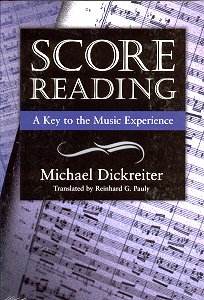Book Review
Score Reading - A Key to the Music
Experience
 By Michael Dickreiter (Translated
by Reinhard G.
Pauly)
By Michael Dickreiter (Translated
by Reinhard G.
Pauly)
 Amadeus Press; Paperback; 264
pages $19:95. ISBN
1-57467-056-5
Amadeus Press; Paperback; 264
pages $19:95. ISBN
1-57467-056-5
AmazonUK
£16.99
AmazonUS
$15.96

If you are just a music lover and not a practising musician, does it really
matter if you cannot read a score? Would it really add anything to your enjoyment
if you could? Well, yes it could, as this useful and straightforwardly written
book proves. Although it is a practical necessity for professional and amateur
musicians and conductors to be able to read scores fluently, listeners can
derive a great deal of pleasure and insight into the design and construction
of a musical work by following its score. One can appreciate, for instance,
more fully the use of specific instruments, and the relationships between
primary and secondary musical lines and voices.
Dickreiter takes the reader through different types of scores (orchestral,
choral chamber, recital etc); looks at their make-up - the arrangements of
the instruments on the score page and its organisation. The historical
development of musical notation and scores through the Renaissance and Baroque,
and the Classical and Romantic periods is traced. Then comes the practical
guidance on how to approach reading a score from scratch.
The biggest asset of this book, though, is that the greater part of it comprises
scores of movements or parts of basic repertory works that most people will
have in their record collections. So you can practice your score reading
by following 10 examples including: the aria 'Erbame dich, mein Gott' ('Have
mercy, O Lord') from Bach's St Matthew Passion, Beethoven's
Romance in F Major for Violin and Orchestra, Mozart's Eine Kleine
Nachtmusik, Chopin's Minute Waltz Schubert's 'Trout' Quintet;
Wagner's Prelude to Tristan and Isolde and Stravinsky's The
Firebird.
This is a very interesting and useful book - one that this reviewer will
be continually dipping into. Ian Lace

